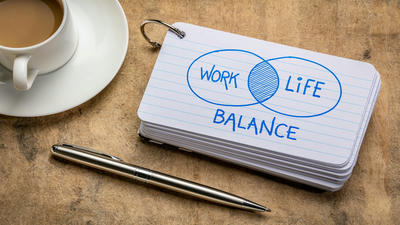
In today’s fast-paced world, achieving a harmonious work-life balance has become a significant challenge for many professionals. The boundaries between work and personal life are increasingly blurred, leading to stress, burnout, and a decline in overall well-being. However, mastering work-life balance is crucial not just for personal health, but also for productivity and job satisfaction.
Understanding Work-Life Balance
What is Work-Life Balance?
Work-life balance refers to the equilibrium between professional responsibilities and personal life. It means allocating time to work-related activities while also ensuring that personal needs, relationships, and leisure pursuits are not neglected. A healthy work-life balance allows individuals to enjoy their personal lives without compromise, contributing to greater job satisfaction and holistic well-being.
Why is Work-Life Balance Important?
Striving for work-life balance is important for numerous reasons, including:
-
Mental Health: Excessive work commitments can lead to stress, anxiety, and burnout. Prioritizing personal time helps improve mental health and resilience.
-
Physical Health: A balanced lifestyle encourages regular exercise, healthy eating, and adequate rest, which are essential for physical well-being.
-
Productivity: When individuals feel balanced, they tend to be more focused and engaged in their work, leading to higher productivity levels.
-
Relationships: Time spent with family and friends fosters meaningful relationships, contributing positively to one’s emotional health.
-
Job Satisfaction: Professionals who achieve work-life balance often report greater job satisfaction and loyalty to their organizations.
Practical Tips for Achieving Work-Life Balance
Achieving a balanced life isn't about completely separating work from personal time; it’s about managing your time and energy effectively. Here are some practical tips that busy professionals can implement to master work-life balance:
1. Set Clear Boundaries
One of the first steps to achieving work-life balance is to establish clear boundaries between work and personal life:
-
Define Work Hours: Make it clear when your workday starts and ends. Communicate these boundaries with colleagues and supervisors.
-
Create a Dedicated Workspace: If working from home, set up a specific area for work. This helps mentally separate your professional responsibilities from personal life.
-
Limit After-Hours Communication: Avoid checking work emails or taking calls after hours unless absolutely necessary. Set policies for yourself that prioritize personal time.
2. Prioritize Your Tasks
Effective time management is critical for maintaining a balance between work and life:
-
Make a To-Do List: Start each day by creating a list of tasks you need to accomplish. Prioritize them based on urgency and importance.
-
Use Time Blocking: Allocate specific blocks of time for different tasks, including breaks, meetings, and personal activities. This method helps you stay focused and organized.
-
Embrace Delegation: If you’re in a leadership position, delegate tasks to team members. Trusting others to handle responsibilities frees up time for you to focus on higher-priority projects.
3. Practice Mindfulness
Mindfulness techniques can help professionals manage work-related stress and enhance focus:
-
Take Breaks: Schedule regular breaks throughout the workday. Short breaks can re-energize you, improve concentration, and enhance overall productivity.
-
Practice Deep Breathing: Engage in deep-breathing exercises during moments of stress. Deep breathing helps calm the mind and reduce anxiety.
-
Limit Distractions: Identify distractions that affect your focus, such as social media or excessive noise. Use tools designed to minimize interruptions during work hours.
4. Leverage Technology
In today’s digital age, technology can be both a blessing and a curse. Use it wisely to enhance your work-life balance:
-
Use Productivity Apps: Consider using apps that help you manage tasks, track time, or organize projects. Tools like Trello, Asana, and Todoist can streamline your workflow.
-
Set Automatic Alerts: Use calendar alerts to remind yourself of meetings, breaks, and personal commitments. Set notifications to keep you on track.
-
Limit Notifications: Turn off non-essential notifications on your phone and computer to minimize distractions and interruptions from work-related tasks.

5. Make Time for Yourself
Self-care is vital for achieving work-life balance. Allocate time to activities that bring you joy and relaxation:
-
Engage in Hobbies: Dedicate time to hobbies and passions outside of work, whether it’s painting, gardening, or playing a musical instrument.
-
Stay Active: Incorporate physical activity into your routine. Regular exercise boosts mood, reduces stress, and enhances productivity.
-
Practice Self-Care: Make self-care rituals a regular part of your life. Whether it’s skincare, reading, or meditation, prioritize those moments that rejuvenate you.
6. Foster Strong Relationships
Strong relationships contribute to emotional well-being and overall happiness. Prioritize time for family and friends:
-
Schedule Social Activities: Just like work meetings, schedule time for social activities with friends and family. Treat these as equally important appointments.
-
Communicate Openly: Stay connected with loved ones. Share your challenges and accomplishments; open communication builds stronger relationships.
-
Limit Work Conversations: When spending time with family or friends, try to limit work-related conversations. Use this time to reconnect and enjoy each other’s company.
7. Reflect and Adjust
Achieving work-life balance is not a one-time effort; it requires ongoing reflection and adjustment:
-
Assess Your Progress: Periodically evaluate whether your current balance is working for you. Are you feeling overwhelmed? Are personal relationships suffering?
-
Be Adaptable: Life is unpredictable. Be prepared to adapt your strategies as your work and personal circumstances change.
-
Seek Feedback: Don’t hesitate to ask for feedback from colleagues and family regarding your work-life balance. Their perspective may identify areas for improvement.
Overcoming Obstacles to Work-Life Balance
While striving for work-life balance is commendable, professionals often encounter obstacles that hinder their efforts. Here are common challenges and how to overcome them:
1. Workplace Culture
In some organizations, a demanding culture can discourage employees from prioritizing work-life balance. To counter this, consider:
-
Promoting Balance Within Your Team: Advocate for a culture of balance at your workplace by setting an example through your own practices.
-
Discuss Flexible Work Options: If your job allows it, consider discussing flexible working hours or remote work options with your supervisor.
2. Perfectionism
Many professionals struggle with perfectionism, leading to overcommitment and burnout. Combat perfectionism by:
-
Setting Realistic Goals: Acknowledge that not every task requires perfection. Set achievable goals and recognize accomplishments, regardless of minor imperfections.
-
Embracing Failure: Understand that mistakes are part of growth. Accepting failure can reduce the pressure to be perfect in every endeavor.
3. Guilt
Professionals may experience guilt when taking time for themselves, believing it detracts from their job performance. To address this:
-
Recognize Your Value: Understand that taking breaks enhances productivity and creativity. Taking time for yourself is an investment, not a setback.
-
Reframe Your Mindset: Instead of viewing self-care as indulgent, frame it as essential for sustaining long-term performance and well-being.
Conclusion
Mastering work-life balance is a continuous journey that requires self-awareness, discipline, and commitment. By implementing practical strategies and fostering healthy habits, busy professionals can reclaim control over their time and energy. Striving for a balanced life is not only beneficial for personal well-being but also enhances productivity and job satisfaction.
As you navigate the intricacies of professional life, remember that achieving work-life balance is a priority worth pursuing. Take small steps, be patient with yourself, and adjust as needed. In doing so, you’ll find a more fulfilling and rewarding career while enjoying a rich and meaningful personal life.



